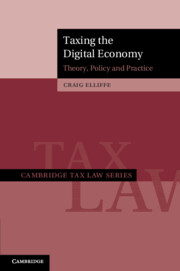Book contents
- Taxing the Digital Economy
- Cambridge Tax Law
- Taxing the Digital Economy
- Copyright page
- Dedication
- Contents
- Figures
- Preface
- Acknowledgements
- Part I
- Part II
- 5 The OECD Secretariat’s and Inclusive Framework’s Proposals for Multilateral Reforms
- 6 Examining the Proposals for Multilateral Reforms
- 7 Implementing the Proposals for Multilateral Reforms
- 8 The Influence of Alternative Policy Strategies on the 2020s Compromise
- 9 Interim Solutions and Long-Term Reforms
- Index
7 - Implementing the Proposals for Multilateral Reforms
from Part II
Published online by Cambridge University Press: 23 April 2021
- Taxing the Digital Economy
- Cambridge Tax Law
- Taxing the Digital Economy
- Copyright page
- Dedication
- Contents
- Figures
- Preface
- Acknowledgements
- Part I
- Part II
- 5 The OECD Secretariat’s and Inclusive Framework’s Proposals for Multilateral Reforms
- 6 Examining the Proposals for Multilateral Reforms
- 7 Implementing the Proposals for Multilateral Reforms
- 8 The Influence of Alternative Policy Strategies on the 2020s Compromise
- 9 Interim Solutions and Long-Term Reforms
- Index
Summary
The multilateral proposed changes require significant infrastructural changes to the existing tax framework. How should such changes be implemented? Some changes are required at both the domestic law level and in the public international law arena of double taxation treaties. Other changes can be made in one or other of these fields of law (domestic or international). What other matters need to be addressed? There are many questions in the area of implementation, such as dispute resolution and dispute prevention, calculation and collection of tax, use of multilateral instruments, and the prevention of double taxation.
Keywords
- Type
- Chapter
- Information
- Taxing the Digital EconomyTheory, Policy and Practice, pp. 237 - 262Publisher: Cambridge University PressPrint publication year: 2021

